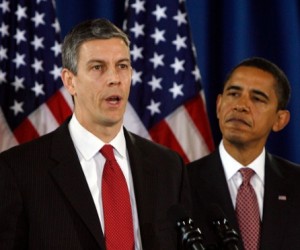
By Jana Kasperkevic, The Guardian
Sonia Chavez was watching the evening news on Univision when a report caught her eye. President Barack Obama was on her TV, talking about raising wages for federal contractors to $10.10, effective from January 2015.
“He’s talking about me,” she thought.
That was more than a year ago. It is now April 2015, and she is still not earning $10.10 an hour.
Chavez works two jobs. In the morning, she cleans private homes. In the afternoon, at 5pm, she begins a four-hour shift as a janitor at the Department of Education, in Washington DC.
Scared to bring up her low pay with her employer, Sabree, Chavez talked to some co-workers. She then reached out to Good Jobs Nation, a group of low-wage federal contract workers, for help.
On Thursday, Good Jobs Nation filed a complaint with the Department of Labor, asking it to investigate three contractors awarded contracts with the Department of Education, the Department of the Interior and the Smithsonian Institution.
“Good Jobs Nation has been contacted by employees of three federal contractors in Washington DC who have provided convincing evidence that they and their co-workers are being unlawfully compensated at levels far lower than those set by the Service Contract Act [SCA],” the complaint reads.
“These violation of the SCA are substantial, widespread, and persistent, and … have deprived the affected workers of over $1,578,700 in unpaid wages.”
According to George Faraday, Good Jobs Nation’s policy director, the SCA sets wages for 300 job categories, among them janitors, bus drivers and groundskeepers.
The complaint filed on Thursday claims that janitors employed by Sabree – and possibly subcontractor Ace Janitorial Services – are underpaid. The employees on whose behalf the complaint was filed, including Chavez and her husband, Anibal Estrada, earned between $9.10 and $9.65 and received no benefits. Under the SCA, janitors in Washington DC should be paid $11.83 an hour plus $4.02 an hour in health and welfare benefits, according to the complaint.
It goes on to say that groundskeeping staff at the Smithsonian National Zoo and drivers of sightseeing buses touring the National Mall and Arlington National Cemetery are also covered by the SCA and as such are currently underpaid.
In response to the Guardian’s requests for comment, Dorie Nolt, press secretary at the Department of Education, issued a statement which said: “The well-being of every person who works in our buildings, whether or not [they] are employed directly by the US Department of Education, is important to us. The General Services Administration manages the Department’s headquarters facilities, including the janitorial/custodial contract.
“GSA is working with the vendor to ensure that employee concerns are appropriately addressed in a timely manner.”
Sabree, which did not respond to the Guardian, does not count the Department of Education among its partners and affiliates; it does list other agencies including the Department of Homeland Security, FBI, US army and Department of Defense. In addition to providing janitorial services, Sabree specializes in construction, renovations and concrete work.
Good Jobs Nation has not looked into whether other departments within the federal government work with contractors that might be underpaying their workers. The organization has limited resources, said communications director Paco Fabian. He added that contracts at other departments would be worth exploring.
The organization did not reach out to the contractors named in the complaint prior to filing it. Workers, afraid of potential retaliation, did not raise the issue with their employers.
“We decided to file the complaint because we feel cheated by our employer,” Chavez told the Guardian. “Earning what we should can help us provide a better life for our children, maybe even send them to college.”
Chavez works 20 hours a week for Sabree, cleaning offices including that of Arne Duncan, the secretary of education.
“I don’t work for him, I am not his employee, but I clean his office,” said Chavez. She said that in addition to talking about the race to the top in education, Duncan should talk about race to the top for wages.
Until two months ago, Chavez was earning $9.35 an hour. She now earns $9.50. Her husband, who briefly left his job with Sabree to be a commercial painter and then came back, only works as a janitor in the evenings. He still earns $9.35, she told the Guardian.
Since July 2014, the minimum wage in Washington DC has been $9.50. Since January 2015, the minimum wage for federal contractors is supposed to have been $10.10.
Chavez said she and her husband received no benefits – no health insurance and no paid vacation.
“We regularly get eviction notices because we cannot afford to pay rent on time,” she said.
Chavez used to rely on food stamps, but since she got a second job cleaning homes during the day she no longer qualifies. She and her husband still rely on charities to clothe and feed their three children, she said. The children qualify for free breakfast and lunch at school.
Since it was Obama who first made her realize what was going on, Chavez is calling on him for help.
“The president should step in,” she said. “He needs to guarantee that workers like me are protected by the law. Currently, although the law is supposed to protect us, it’s not. We need him to do more than the minimum.”
In his latest report for Good Jobs Nation, called The Return of Federal Sweatshops?, George Faraday argues that the president should use his executive powers to create preference for federal contractors who pay their workers a living wage of $15 an hour, offer benefits and allow their workers to unionize.
In addition to using an executive order to raise contractors’ minimum wage to $10.10, Obama has used his powers to help US departments and agencies identify contractors who comply with labor and employment laws.
